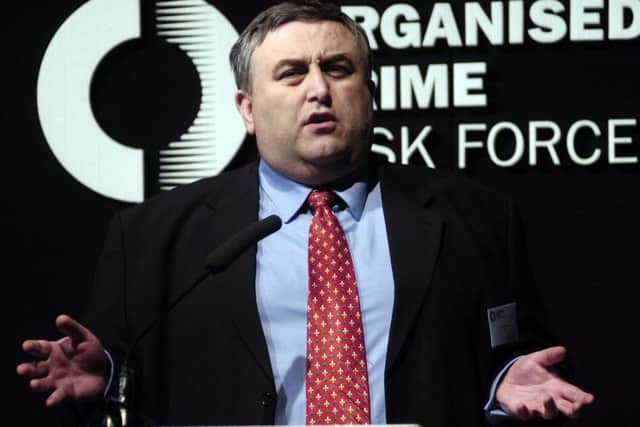Legacy Scandal: '˜The peace process has destroyed the ability to deliver for victims,' writes Alan McQuillan


As a police officer, in the RUC and PSNI, we spent almost 30 years trying to deal with terrorism and uphold the law.
I still believe that the most fundamental issue in building a shared future for our children is to ensure that we have a political system with honest, open, democratic institutions based on the rule of law.
Advertisement
Hide AdAdvertisement
Hide AdA key step along the way is finding a mechanism that respects those who lost their lives or were injured, and their families, and allows us all move on.


That is a tall order. There were many victims who experienced many different traumas and it has affected their lives in many ways.
I know from listening to people who have suffered that they want many different things. Some want prosecutions, some want the truth, some want compensation and some just acknowledgement. Some want to put away the past. A few have decided on their own version of the past.
So, will the legacy proposals help us move on? With regret, I fear not.
Advertisement
Hide AdAdvertisement
Hide AdToday I want to focus on just one aspect of this – the proposed new Historic Inquiries Unit (HIU).


During the Troubles over 3,600 people were killed and tens of thousands injured. Behind these lie all the others who shared the trauma.
The HIU will be an independent new police organisation, separate from PSNI, focused on re-investigating 1,700 historic murders over just five years .
There will be many hurdles.
Victims’ groups backed by a voracious legal industry and politicians will press it at every stage, seeking priority for ‘their’ cases. This litigation will push the programme towards a minority of cases.
Advertisement
Hide AdAdvertisement
Hide AdThen there are the sheer practicalities. In the rest of the UK there are around 800 murders a year, most of which are relatively simple cases.
The new HIU role will increase the volume of UK investigations by around 45%. A typical ‘simple’ murder investigation demands a team of say six staff for four to six months, with many more for a complex investigation or major terrorist crime.
Anything less than full re-investigations – rightly - will be legally savaged as inadequate and non-compliant with European Convention on Human Rights (ECHR). So for the HIU to deliver within five years, if we are generous and assume each six person team can finalise even three cases a year, that still requires around 110 teams – say 650 investigative staff.
Where are the investigators to come from? Well, former NI police officers are probably excluded. Nationally in the UK there is a shortage of skilled investigators and how many will volunteer to move to NI? Perhaps they are to come from abroad but be retrained in the UK legal system and thrown into the complexity of NI’s past? I wish them success.
Advertisement
Hide AdAdvertisement
Hide AdThe experienced staff necessary to deliver this simply do not exist. Does the capacity also exist within the courts, forensic services and all the other agencies to support such a massive increase in activity with all the subsidiary litigation it will generate, even without prosecutions?
As for the budget – 650 investigators will cost at least £26m a year for the payroll never mind supervisory staff, accommodation and support services. Based on old figures for HET costs, £40m a year might be needed.
More and more, the planning for this begins to sound like an Northern Ireland Office version of RHI!
If the budget is really set at just £10m a year, then the timescales must lengthen dramatically. The pressure to focus on cases where there is most political lobbying and legal pressure will be all the greater.
Advertisement
Hide AdAdvertisement
Hide AdAnd what might even a fully resourced HIU be able to deliver? The chief constable has said he expects 4% at most of the cases to lead to criminal prosecution. That’s about 70 cases. In trying to deliver even those, the investigators will face the problems that PSNI and the Police Ombudsman still contend with:
• the lapse of time affecting the availability and memory of witnesses
• the loss or deterioration of exhibits and records
• the government’s agreement with terrorist groups to destroy all information on weapons decommissioned and prevent forensic tests
• the legislation on the disappeared which prohibits collection of forensic evidence or disclosure of anything that might indicate what happened to them before they were murdered
Advertisement
Hide AdAdvertisement
Hide Ad• the transfer of all intelligence responsibility for republican groups to the security services
• political pressure, not least from the two governments, not to pursue those whose arrest might ‘destabilise the peace process’
• the assurances in no prosecution letters issued by the government the impact of which is still to be tested
• the need to comply with Article 2 ECHR rights in dealing with information that might endanger informants
Advertisement
Hide AdAdvertisement
Hide Ad• the huge backlog of legal actions, inquests and judicial reviews and demands for speedy disclosure in them.
The proposals also ignore the cross-border dimensions of many past crimes. There is no equivalent information retrieval or investigative process on the Irish side, no archive of evidence in past cases, no commitment to co-operate in these cases.
Above all, there is no desire to reopen the complex issue of the past partly exposed by the Smithwick Tribunal, which heard evidence of political interference in investigations, the wilful ‘loss’ or destruction of evidence and found a culture of denial.
Despite the assurances of a British government frozen in the headlights of trying to re-establish Stormont, most cases capable of reinvestigation will be those where the allegation is that individuals were killed by state agencies. Those are the cases where the forensics and the records will mostly still be available and where legal and political pressure will demand priority.
Advertisement
Hide AdAdvertisement
Hide AdAs for the rest, to borrow Lady Hallett’s regretful assessment after the OTR letters debacle – that no action to bring suspects to justice was possible as mistakes had been made that could not be undone and the families “have no choice but to come to terms with that fact, as devastating as I know it has been”.
I fear that many of the decisions made in earlier stages of the peace process have utterly undermined, indeed destroyed, our real ability to deliver for victims.
I spent most of my professional life trying to protect people across the community. I want to see us all deliver for victims and their families, where it is possible to do so.
Let me be clear too that if police officers or soldiers committed crimes, I want them held to account. But this must be part of a process that fairly addresses all the past incidents.
Advertisement
Hide AdAdvertisement
Hide AdI am sorry that these proposals are so far from what would deliver justice for the vast majority of victims that they seem almost designed to fail. It will continue to slide into a one-sided process that focuses on those who tried to prevent the violence, rather than those who murdered.
There are many reasons for this, including the fact that the state had records, but one of the main problems is an imbalance in legal and political representation when it comes to demands for investigations, which are overwhelmingly from one side of the community.
Parity of esteem demands that there should be balance in this as well.
Government made the mistake years ago of letting the term ‘collusion’ be perverted from all real sense of meaning and then weaponised for political ends. It must not be allowed to do the same with ‘justice’ itself.
• Alan McQuillan was an assistant chief constable in the RUC when it became the PSNI and later head of the Assets Recovery Agency